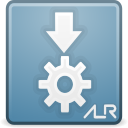alr2appimage is a tool to automatically create an
AppImage executable from an Alire crate.
Note
alr2appimage is an independent project; it is not
affiliated to, nor supported by, the Alire or AppImage projects.
There are two prerequisites for your project to work with this tool:
- It has to be a crate with an
executablesfield. Its first value has to be the main application program. Alternatively, you can provide a value in the command line. - It must be installable using Alire or gprinstall, including all the needed resources.
alr2appimage will use the following command for installing it (this requires Alire 2.0):
alr installOr it will run gprinstall inside alr exec, if the former fails (Alire 1.x).
If you simply run the tool inside an Alire crate, it will read the
metadata from your alire.toml file and create a default AppImage
from it.
The utility linuxdeploy
is automatically downloaded using curl or wget tools. If you
cannot install one of these utilities or lack an Internet connection in the
host, just put a copy of the linuxdeploy-your_arch.AppImage in the
crate directory, and it will be used by alr2appimage.
This tool will generate a valid Destop Entry
for the AppImage. The following metadata will be read from your
alire.toml for the generation, and will be matched to the equivalent
field of the your_crate.desktop file:
| Alire | Desktop | Comment |
|---|---|---|
name |
Name |
It will also be the base name of your AppImage file. |
description |
Comment |
|
tags |
Keywords |
Additionally, any of the tags matching (case-insensitively) one of the main categories in the freedesktop.org menu specification will be used as Categories. |
executables |
Exec |
The first executable is used as entrypoint of the AppImage. It can be orverriden using the --executable your-executable-file argument. |
Terminal |
This field of the desktop entry will be set to false by default. It can be set to true passing the --terminal argument. |
|
Type |
This field of the desktop entry will be set to Application. |
|
Icon |
By default, the included icon (alr2appimage.png) will be used. It can be orverriden using the --icon your-icon-file argument. |
If your crate has resources, the fist step is to just include this section to your GPR file:
package Install is
for Artifacts (".") use ("share");
end Install;And add the resource files in the repository in that directory, e.g. in share/.
The next step is referencing the resources from the application. it
is recommended to use the
resources crate,
or a similar mechanism, to properly load the resource files from the installation
prefix. alr2appimage is doing this for the default AppImage icon.
Another approach, if you don't want to add another dependency, is
doing the logic of getting the base directory of the executable by
yourself. This is an example of how to do this, assuming it's running
under Linux and the executable is located under <prefix>/bin/.
function Application_Prefix return String is
Self_Exe : constant String := "/proc/self/exe";
begin
-- Get the resources path through the directory where the program is
-- located.
-- In this way we allow running from an AppImage and still find the
-- resource files.
--
if Ada.Directories.Exists (Self_Exe) then
return Ada.Directories.Containing_Directory
(Ada.Directories.Containing_Directory
(Ada.Directories.Full_Name (Self_Exe)));
else
return "";
end if;
end Application_Prefix;Usage: alr2appimage [OPTIONS]...
Makes an AppImage from your Alire crate.
-h, --help Display this help text.
-V, --version Display the version of this utility.
-t, --terminal Set the Terminal flag of the AppImage to true, i.e. the application is for the terminal or requires to be run from a terminal.
-i, --icon Specify the icon file for the AppImage
-e, --executable Specify the executable for the AppImage (without path)
Run inside an Alire crate to create a default AppImage of your application. With the corresponding arguments, you can override the executable, provide your own icon and override the default value (false) for the terminal field.
The tool is considered complete, although it could be developed further.
The following feature could be implemented in the future, if deemed useful for the users:
- Not implemented yet: If the defaults are not good for your
project, you can also define a template for your desktop file, and
only the fields that you want will be included from the
alire.tomlor initialized by this utility.
Can be built and installed after cloning the repository using Alire.
You can also download an AppImage from the releases section or use
alr install alr2appimage to install the utility from the Alire index.




